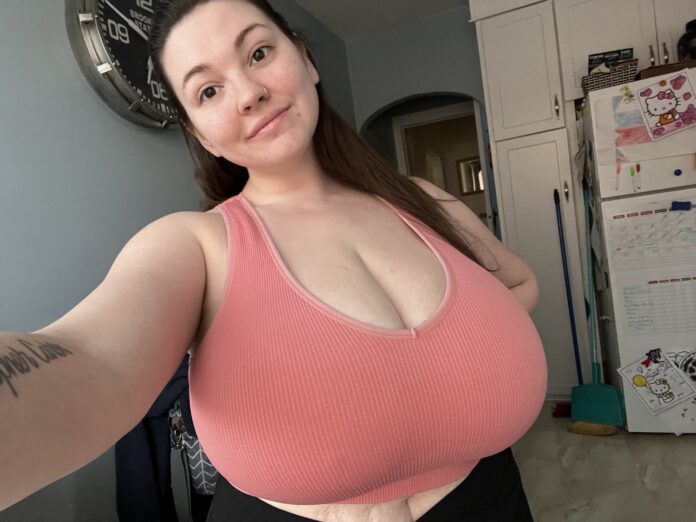Weight criticism and fat-shaming have long been a part of American culture. The slurs are most often targeted at women who don’t meet societal standards of beauty, meaning a slender body. Lyla King has been the object of such bullying most of her life, starting in middle school when her body matured faster than the other girls’. When she was in seventh grade, Lyla’s hormones caused her breasts to grow bigger than average, and that opened her up to intimidation and ridicule.
Growing up with a curvy figure, Lyla was always a target for cruelty. As an adult, she became a disabled single mother due to a neurological condition that causes physical issues that leave her unable to work a regular job.
“My stress comes out in physical symptoms,” Lyla explains. “It’s very much a mental health thing. But it is very real because a literal part of my brain kind of just shuts off when I get too stressed out, and it comes out in physical symptoms like numbness in my hands, seizures, temporary paralysis, stuff like that.”
Unable to do other work, Lyla began posting tasteful and sometimes humorous videos of herself on social media. She championed body positivity in a world that often refuses to consider that anyone who is overweight could have good qualities.
Some pockets of American culture started a movement for body positivity, only to be met with a backlash. Even medical professionals and scientists became critical of the movement to reduce fat shaming, which only asked that overweight people be helped, not bullied.
The British scientific journal Obesity published an article in 2018 called “Normalization of Plus Size and the Danger of Unseen Overweight and Obesity in England.” Author and professor Raya Muttarak concluded in the article that body positivity was to blame for obesity. The news media jumped all over this conclusion, accepting her conclusion.
However, an article in Psychology Today right after the study was published called Muttarak’s conclusion and the resulting publicity “sloppy science, sloppy peer review, and sloppy journalism.”
“Muttarak’s research merely looked at the associations between people’s BMI, their self-perception of their body weight, and whether they reported that they were trying to lose weight,” writes Jessica Alleva, Ph.D., in the magazine’s “Mind Your Body” column.
In her article, Alleva continues, “The research did not – in any way – investigate or even assess whether the body-positive movement has had any impact on people’s BMI, their perception of their body weight, or their attempts to lose weight.”
Lyla King has long been aware of these prejudices against people, especially women, who don’t fit the approved beauty standards. She saw it in school, and she saw it in the comments of her videos. However, overall Lyla finds that her social media followers have helped reverse her insecurity about her curvy shape and large breasts.
“It’s definitely made me more confident about my body and my breasts. With how big they are, I thought I looked weird for a long time,” Lyla says. “With all the attention that social media gives me plus all the nice things my subscribers say about me, I really feel more comfortable in my own skin.”
Not everyone leaves positive comments, of course. The internet is full of trolls just waiting to spout hate, but even facing relentless online criticism, Lyla King chooses to stand firm and embrace her unique body shape. She has turned negativity into a powerful message of self-acceptance. Her journey from being body-shamed to becoming an influencer who champions body positivity helps her build a supportive community around her bold stance against weight shaming.
When she first started, Lyla had to figure out how to be an influencer as she went along, and it continues to work out well for her.
“It’s a lot of trial and error. Also, because of the videos I started posting on TikTok, the algorithms pointed me toward other women doing the same thing. So I observed certain things other women were doing but tweaked them to be my own.”
One day last fall, she awoke to find that one of her videos went viral overnight, getting nearly 300,000 views. Now, she is expanding her reach and has become one of the SuicideGirls, a group of beautiful women on a website of the same name. On the site, the women are described as “exceptionally interesting and stylish” and “the most crush-worthy women we could find on the planet, the girls with style and grace and sexiness that we love.”
The name SuicideGirls means that they are considered to be committing social suicide by celebrating their unconventional beauty. These are women with tattoos, hair in various colors and cuts, curvy bodies, or other factors not traditionally considered beautiful by current societal norms. They don’t care.
On SuicideGirls and Instagram, she’s known as Lylasbigheart. This is partly because of her compassion for other women who have been body-shamed and partly for her gratitude for the followers and subscribers who love her. However, it is also a reflection of a chest so big that her heart must be extra big, too. That certainly appears to be true.


… [Trackback]
[…] Here you will find 97608 more Information to that Topic: calipost.com/from-online-criticism-to-online-fame-lyla-kings-bold-stand-against-body-shaming/ […]